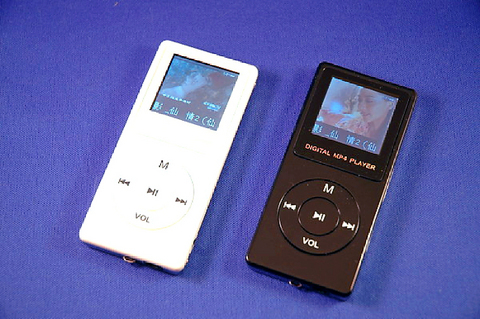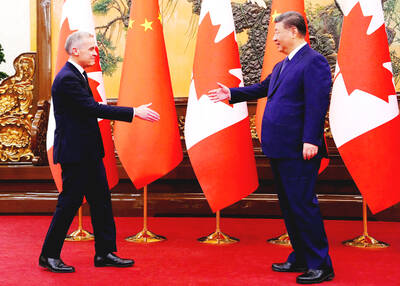As young consumers scramble to snap up Apple Computers' iPod series of portable music players, imitation products have inevitably popped up on the market. Some of these, only available through somewhat circuitous channels over the Internet, sail very close to the wind in imitating Apple's now iconic products.
These rip-offs can cost as little as half the price of the real thing, and their functions and appearance are, at first glance, indisting-uishable from real iPods. The giveaway is that they are currently only available online or after setting up an appointment.
These imitation iPods go under the name of the Nano Apple. According to a representative of the manufacturer, who would only give her surname as Chang, the devices are manu-factured in China and marketed in Taiwan under a number of different brands.

PHOTO: TAIPEI TIMES
The Nano Apple is available in three different storage capacities: 512 MB, 1GB, 2GB. If you don't look carefully, the device could easily be mistaken for original Apple iPod nanos. The most noticeable difference is that instead of "Menu," which is written on the iPod nano's dial, the Nano Apple has an "M." Also, the Nano Apple's "play" button is in the center of the dial, and volume is controlled at the bottom of the dial. Both have 1.5-inch screens, and despite the slight alteration in the placement of the function keys, the look, finish and feel of the devices makes them indisting-uishable from Apple Computer's product to the casual observer.
And of course, these knock-offs are considerably cheaper than the iPod. While the 1G iPod nano, the model with the smallest storage capacity, retails for NT$5,300, the 1G knockoff sells for NT$2,300. What's more, the knockoffs have video capability, a feature which is only available in 30G and 60G video iPods, which retail for over NT$10,000.
Despite some concerns about quality, it is no surprise that the Nano Apple is flying off the shelf, so to speak, and sites selling the device online have difficulty keeping up with demand. Anecdotal evidence also suggests that these
attractive looking knockoffs appeal to Taiwan's style-conscious youth.
For those who value function-ality over fashion cachet, it is worth noting that the smallest Nano Apple only has a meager storage capacity of 512M, and has a significantly shorter battery life than the iPod nano. Nevertheless, for those simply looking to get the latest gimmick, the knockoffs offer a cheap option. When contacted by the Taipei Times, Apple Computers refused to comment on the imitation music players.
Chinese-language media reports have suggested that the knockoff nanos do not have the same guarantee of quality as the originals, pointing out that they are made in China. Apple's own iPods are also made in China, and in a phone interview with Taipei Times, Chang said that her company, also provided full after service. According to Chang, the Nano Apple can be returned within seven days of purchase with the original receipt and packaging for a full refund.
"We provide after-sales service and irresistible functions that a real iPod nano is not able to offer. It is a simply a matter of supply and demand," said Chang.

On a harsh winter afternoon last month, 2,000 protesters marched and chanted slogans such as “CCP out” and “Korea for Koreans” in Seoul’s popular Gangnam District. Participants — mostly students — wore caps printed with the Chinese characters for “exterminate communism” (滅共) and held banners reading “Heaven will destroy the Chinese Communist Party” (天滅中共). During the march, Park Jun-young, the leader of the protest organizer “Free University,” a conservative youth movement, who was on a hunger strike, collapsed after delivering a speech in sub-zero temperatures and was later hospitalized. Several protesters shaved their heads at the end of the demonstration. A

Google unveiled an artificial intelligence tool Wednesday that its scientists said would help unravel the mysteries of the human genome — and could one day lead to new treatments for diseases. The deep learning model AlphaGenome was hailed by outside researchers as a “breakthrough” that would let scientists study and even simulate the roots of difficult-to-treat genetic diseases. While the first complete map of the human genome in 2003 “gave us the book of life, reading it remained a challenge,” Pushmeet Kohli, vice president of research at Google DeepMind, told journalists. “We have the text,” he said, which is a sequence of

In August of 1949 American journalist Darrell Berrigan toured occupied Formosa and on Aug. 13 published “Should We Grab Formosa?” in the Saturday Evening Post. Berrigan, cataloguing the numerous horrors of corruption and looting the occupying Republic of China (ROC) was inflicting on the locals, advocated outright annexation of Taiwan by the US. He contended the islanders would welcome that. Berrigan also observed that the islanders were planning another revolt, and wrote of their “island nationalism.” The US position on Taiwan was well known there, and islanders, he said, had told him of US official statements that Taiwan had not

Britain’s Keir Starmer is the latest Western leader to thaw trade ties with China in a shift analysts say is driven by US tariff pressure and unease over US President Donald Trump’s volatile policy playbook. The prime minister’s Beijing visit this week to promote “pragmatic” co-operation comes on the heels of advances from the leaders of Canada, Ireland, France and Finland. Most were making the trip for the first time in years to refresh their partnership with the world’s second-largest economy. “There is a veritable race among European heads of government to meet with (Chinese leader) Xi Jinping (習近平),” said Hosuk Lee-Makiyama, director